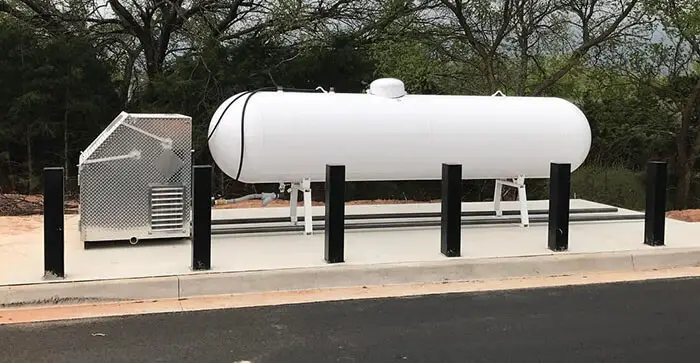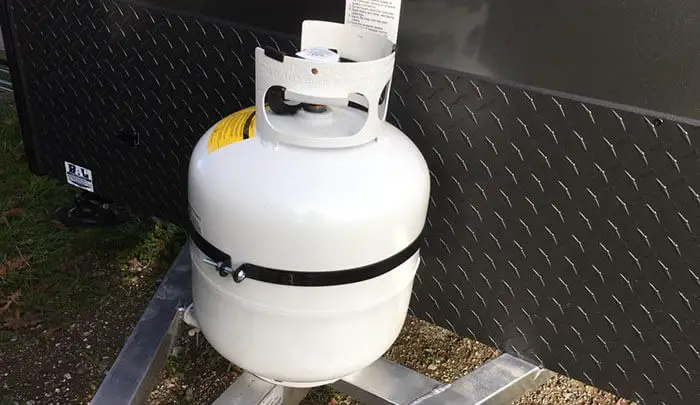As a camper like me, you’re probably not thinking about propane tanks until it’s cold outside and your RV is freezing. According to the National Weather Service, propane tanks can freeze in temperatures as low as 60 degrees Fahrenheit.
Also according to a case study done by the National Fire Protection Association, there are an average of 30 RV fires caused by propane each year in the United States. Of these fires, about 10% are caused by frozen propane tanks.
While this may not seem like a lot, it’s important to remember that RV fires can be very damaging and even deadly.
Unfortunately, if your RV propane tank freezes, it can cause some serious problems. So, I’ll go over how to keep your RV propane tank from freezing, so you can stay warm all winter long and enjoy your trip worry-free!
Why are RV propane tanks freezing?
There are a few reasons why your RV propane tank might freeze.
1. The most common reason is that the temperature outside is too cold. If it’s below freezing, the propane in your tank can start to turn into a solid. RV propane tanks are designed to withstand a certain amount of pressure.
However, when the temperature drops too low, the pressure in the tank can drop as well. This can cause the tank to freeze, which can damage the tank and potentially cause a leak.
2. Another reason why your RV propane tank might freeze is that there’s water in the tank. If there’s water in the propane, it can start to freeze and expand, causing the tank to freeze.
3. Lastly, if your RV propane tank is low on propane, it can also cause the tank to freeze. When there’s less propane in the tank, the liquid propane can start to turn into a gas. This gas can expand and cause the tank to freeze.
What can happen if an RV propane tank is frozen?

Some potential problems can happen frozen propane tank
– The propane tank could rupture if the pressure inside gets too high.
– Propane could leak out and potentially cause a fire or explosion.
– The tank could become damaged and need to be replaced.
– You may not be able to use your RV if the propane tank is frozen.
If you’re concerned about your RV propane tank freezing, be sure to follow the tips listed above. This will help to keep your RV propane tank from freezing, even in very cold temperatures.
How do you prevent an RV propane tank from freezing?
There are a few things that you can do to prevent your RV propane tank from freezing:
1. Keep your RV propane tank full:
A full RV propane tank is less likely to freeze than an empty one. This is because the liquid propane in the tank helps to keep the Tank Pressure Regulator (TPR) cold, which prevents the pressure from dropping too low.
2. Use a propane tank cover:
A propane tank cover helps to insulate the tank and keep the temperature from dropping too low.
3. Keep your RV in a heated garage:
If you have the option, keeping your RV in a heated garage or storage unit will help to prevent the propane tanks from freezing.
4. Use a propane tank heater:
A propane tank heater is a small, electric heating element that attaches to the outside of the propane tank. This will help to keep the tank warm, even in cold temperatures.
5. Use RV antifreeze in your propane lines:
RV antifreeze (also called non-toxic propane antifreeze) is a glycol-based solution that you can add to your propane lines. This will help to keep the propane from freezing in the lines, even if the temperature outside is very cold.
6. Insulate your RV propane tanks:
You can insulate your RV propane tanks with foam insulation, covers, or even blankets. This will help to keep the heat in and the cold out.
7. Use a propane tank regulator:
A propane tank regulator helps to keep the pressure in the tank from dropping too low. This can prevent the tank from freezing, even in very cold temperatures.
8. Use a propane tank warmer:
A propane tank warmer is a small, electric heating element that attaches to the outside of the propane tank. This will help to keep the tank warm, even in cold temperatures.
9. Keep your RV in a heated storage unit:
If you have the option, keeping your RV in a heated storage unit will help to prevent the propane tanks from freezing.
Hopefully, these tips will help you to keep your RV propane tanks from freezing. However, if you do find that your RV propane tank has frozen, there are a few things that you can do to thaw it out:
How to fix an Already Frozen Propane Tank?

If your RV propane tank has already frozen, there are a few tips that you can do to thaw it out:
1. Use a hairdryer: A hairdryer can help to thaw out a frozen RV propane tank. Just be sure not to hold the hairdryer too close to the tank, as this could damage the tank.
2. Use a heat lamp: A heat lamp can also help to thaw out a frozen RV propane tank. Just be sure not to put the heat lamp too close to the tank, as this could damage the tank.
3. Use hot water: You can also thaw out a frozen RV propane tank by using hot water. Just be sure not to use water that’s too hot, as this could damage the tank.
4. Use a propane tank heater: A propane tank heater is a small, electric heating element that attaches to the outside of the propane tank. This will help to thaw out the tank, even in cold temperatures.
5. Use a propane torch: A propane torch can also help to thaw out a frozen RV propane tank. Just be sure not to put the torch too close to the tank, as this could damage the tank.
Once you’ve thawed out the RV propane tank, be sure to check for any leaks in the tank or in the propane lines. If you find any leaks, be sure to repair them before using the propane again.
How dangerous is a frozen propane tank?
While a frozen RV propane tank isn’t necessarily dangerous, it can be if the tank is allowed to thaw out on its own. This is because the tank could rupture if the pressure inside gets too high. If this happens, propane could leak out and potentially cause a fire or explosion.
For this reason, it’s always best to thaw out a frozen RV propane tank using one of the methods listed above. Never try to thaw out a frozen RV propane tank by using an open flame, as this could be very dangerous.
In conclusion:
If you’re RVing in cold weather, it’s important to know how to keep your RV propane tanks from freezing. By following the tips above, you can help to prevent your RV propane tanks from freezing.
However, if your RV propane tank does freeze, be sure to thaw it out using one of the safe methods listed above. Never try to thaw out a frozen RV propane tank by using an open flame, as this could be very dangerous.

Hi I’m Joiel Borid Creators of RV Outsider. Wild Life’s first camping was started when I’m 8 years old, at the Home Front Yard. Moto of RV Outsider shares my experience, expertise, and knowledge that I learned, and apprises about my next journey. So stay tuned with RV Outsider.
